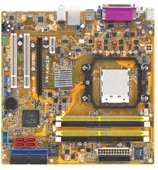I’m a stupid person.
When I bought a new PC the last time, I went for a ASUS M2NPV-MX motherboard with built-in sound and nvidia graphics. I had been told that the nvidia open source driver is fine enough for 2D graphics, and since I never game or anything I’m perfectly fine with 2D-only.
sound and nvidia graphics. I had been told that the nvidia open source driver is fine enough for 2D graphics, and since I never game or anything I’m perfectly fine with 2D-only.
Ok, it didn’t take me long to realize two things about my motherboard:
- The built-in audio “nVidia Corporation MCP51 High Definition Audio” is not supported by Linux/ALSA. It seems to detect it fine and it can show what it is and everything but it can’t produce any sound.
- The open source nVidia driver does not support DVI in resolutions beyond 1280×1024, and it made me wanna cry. I switched to VGA instead, only to realize that the analog output on this board is really noticeably worse than my previous and much older trustworthy Matrox card. (New
 PCI-Express board in the pipe.)
PCI-Express board in the pipe.)
There’s nobody to blame but myself. Lessons for next time: check the audio support better and do not go with nVidia graphics (at all) until they have a good open source driver – and really really check this. (No need to tell me there’s a binary-only nvidia driver, I know about it but I hate it and I hate the inconveniences dealing with binary drivers cause when you upgrade your system etc.)
Funnily, the motherboard has built-in Ethernet (of course) but I don’t normally use that, as I’m on 802.11g only. My work computer is on the upper floor and my (24 mbit) ADSL connection is downstairs and I like not having to connect all my computers with cables running all over.
 So, back to the story, to get sound for my box I got an old SoundBlaster PCI card from a friend (hej Kjell) and inserted it in the last available PCI slot (the other slot has the wifi card).
So, back to the story, to get sound for my box I got an old SoundBlaster PCI card from a friend (hej Kjell) and inserted it in the last available PCI slot (the other slot has the wifi card).
Now, when I upgrade to a fresh new kernel version with Debian unstable the system boots up and defaults to the (detected but not working built-in) hda_intel stuff, and I must run alsaconf to select my ens1371-equipped SoundBlaster instead. But this is not enough. After I’ve ran alsaconf I can’t get any sound out still, but I have to reboot and when it comes up again I must run aumixer and pull up the master volume and wham, now I have sound…
I’m quite sure this can be fixed in another way, but trying to learn this and figure how I can repair my situation to always work fine in the future is a mighty task that I haven’t yet been able to overcome. I really should get involved in the ALSA project one day…


 I recently shot a little video with my phone (SE w580i) and when I copied it over to my
I recently shot a little video with my phone (SE w580i) and when I copied it over to my 
 sound and nvidia graphics. I had been told that the nvidia open source driver is fine enough for 2D graphics, and since I never game or anything I’m perfectly fine with 2D-only.
sound and nvidia graphics. I had been told that the nvidia open source driver is fine enough for 2D graphics, and since I never game or anything I’m perfectly fine with 2D-only. PCI-Express board in the pipe.)
PCI-Express board in the pipe.)